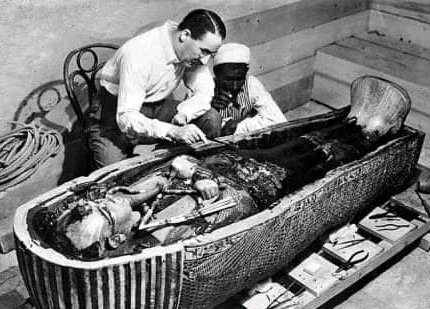pharaoh of the 18th Egyptian dynasty
Tutankhamen (1341 - 1323 BC) was a pharaoh of the 18th Egyptian dynasty

(1333 - 1324 BC). This period was known as the New Kingdom in Egyptian history. His real name is Tutankhatun, meaning "living picture of Aten", while Tutankhamen means "living picture of Amun". Tutankhamun's name was often spelled "amen-tut-ankh", with some inscriptions used to name the deity at the beginning of the expression. It was probably identified with Amarna's letter, Nibhurrereya, and probably with the name of King Rathis of the Eighteenth Dynasty, who, according to the ancient historian Maneton, ruled for nine years (Flavius agrees with Josephus Maneton's idea). His people considered him half human and half god.
Tutankhamen still fascinates everyone. In the room next to the room where his grave was found, where his wealth was, the seal that was used to seal his grave was found and the inscription on it was Tutankhamen. It was discovered by Professor Hawthorn Carter and the others were written by Tutankhamen. When Tutankhamen's coffin was opened on November 11, 1925, he found three more coffins inside. Two of these coffins are in the Cairo Museum. 5397 handicrafts were found inside the tomb. He was unknown to us before his grave was discovered because he had no trace in Egypt. On the wall of his tomb Aka is seen in the pictures as a hunter, a king on the battlefield, a man who was deeply in love with his wife Senamun and Senamun O. Senamun was the daughter of Nefertiti. No one knows the cause of Tutankhamen's sudden death. Tutankhamen's tomb is reopened, as the tombs found 1,000 years after his death are associated with the tomb. In November 1922, Professor Howard Cutter, a British geologist, discovered the tombs of kings. This discovery was remarkable. While the workers were rescuing expensive handicrafts from the grave, they feared the consequences of what had desecrated the grave. Canary was with Howard Cutter while working on Tutankhamen's grave. The day Howard Cutter and Karnamun Tutankhamen enter the tomb, workers see Canary dead. They think it is a good thing for the workers. The Canary Cobra is said to have died of snake bites. The cobra snake is the symbol of the peak of the Pharaohs' mask. From here begins the curse of Tutankhamen. A spokesman for the London Times announced that Pharaoh's curse had struck. Lor Carnarvon was found dead in his hotel room six weeks after his grave room was accidentally opened. Later one by one those who were involved in digging graves started dying. Poison was found in the blood of Carnarvon's brother. In Immania, on the American Jaigud Railroad,
Upvoted! Thank you for supporting witness @jswit.
